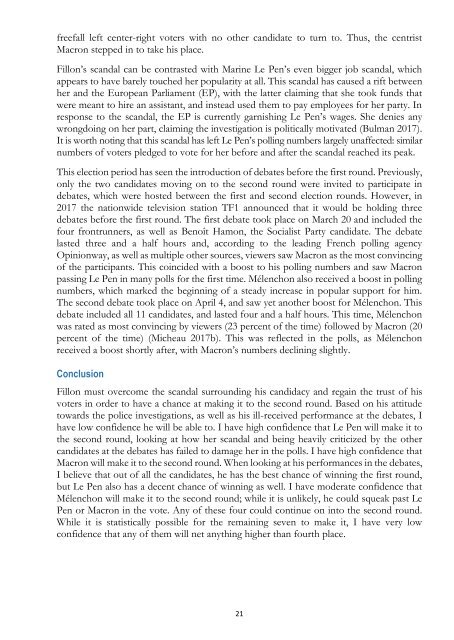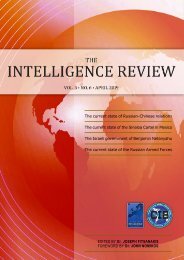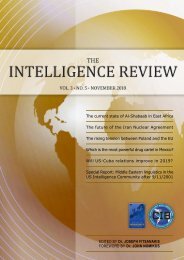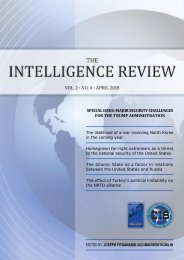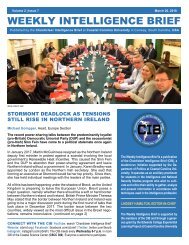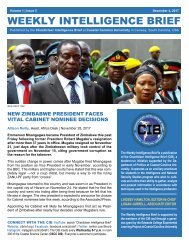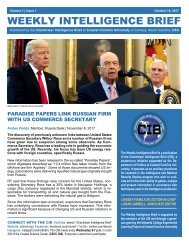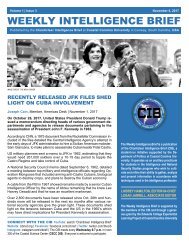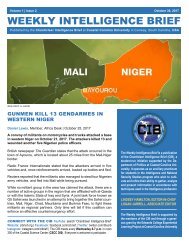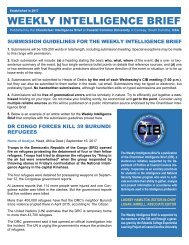The Intelligence Review | volume 2 | issue 3 |
This volume is the product of a collaboration between the European Intelligence Academy (EIA) and the Chanticleer Intelligence Brief (CIB), a student-run initiative supported by the Department of Politics at Coastal Carolina University in Conway, South Carolina, United States. Eight CIB analysts tackle some of the most pressing and timely questions confronting intelligence observers today. Topics in this volume include the current and projected strength of the Islamic State in Libya, the status of unification efforts on the island of Cyprus, the future of the government in Venezuela, and the United States’ place in the Paris climate agreement. There are also papers examining the construction of energy pipelines in Central Asia, as well as aspects of Iranian geopolitics in relation to the United States. Last, though certainly not least, we have included an estimative intelligence analysis of the first round of this year’s presidential elections in France. It refers to an event of global significance that has already taken place. However, it is included in this volume as an illustration of the power of intellectual accuracy and the ability of an intelligence analyst to achieve 100 percent accuracy —as this analyst does— by methodically considering and evaluating the analytical parameters of her question with the right balance of precision and intuition.
This volume is the product of a collaboration between the European Intelligence Academy (EIA) and the Chanticleer Intelligence Brief (CIB), a student-run initiative supported by the Department of Politics at Coastal Carolina University in Conway, South Carolina, United States. Eight CIB analysts tackle some of the most pressing and timely questions confronting intelligence observers today.
Topics in this volume include the current and projected strength of the Islamic State in Libya, the status of unification efforts on the island of Cyprus, the future of the government in Venezuela, and the United States’ place in the Paris climate agreement. There are also papers examining the construction of energy pipelines in Central Asia, as well as aspects of Iranian geopolitics in relation to the United States. Last, though certainly not least, we have included an estimative intelligence analysis of the first round of this year’s presidential elections in France. It refers to an event of global significance that has already taken place. However, it is included in this volume as an illustration of the power of intellectual accuracy and the ability of an intelligence analyst to achieve 100 percent accuracy —as this analyst does— by methodically considering and evaluating the analytical parameters of her question with the right balance of precision and intuition.
You also want an ePaper? Increase the reach of your titles
YUMPU automatically turns print PDFs into web optimized ePapers that Google loves.
freefall left center-right voters with no other candidate to turn to. Thus, the centrist<br />
Macron stepped in to take his place.<br />
Fillon’s scandal can be contrasted with Marine Le Pen’s even bigger job scandal, which<br />
appears to have barely touched her popularity at all. This scandal has caused a rift between<br />
her and the European Parliament (EP), with the latter claiming that she took funds that<br />
were meant to hire an assistant, and instead used them to pay employees for her party. In<br />
response to the scandal, the EP is currently garnishing Le Pen’s wages. She denies any<br />
wrongdoing on her part, claiming the investigation is politically motivated (Bulman 2017).<br />
It is worth noting that this scandal has left Le Pen’s polling numbers largely unaffected: similar<br />
numbers of voters pledged to vote for her before and after the scandal reached its peak.<br />
This election period has seen the introduction of debates before the first round. Previously,<br />
only the two candidates moving on to the second round were invited to participate in<br />
debates, which were hosted between the first and second election rounds. However, in<br />
2017 the nationwide television station TF1 announced that it would be holding three<br />
debates before the first round. <strong>The</strong> first debate took place on March 20 and included the<br />
four frontrunners, as well as Benoît Hamon, the Socialist Party candidate. <strong>The</strong> debate<br />
lasted three and a half hours and, according to the leading French polling agency<br />
Opinionway, as well as multiple other sources, viewers saw Macron as the most convincing<br />
of the participants. This coincided with a boost to his polling numbers and saw Macron<br />
passing Le Pen in many polls for the first time. Mélenchon also received a boost in polling<br />
numbers, which marked the beginning of a steady increase in popular support for him.<br />
<strong>The</strong> second debate took place on April 4, and saw yet another boost for Mélenchon. This<br />
debate included all 11 candidates, and lasted four and a half hours. This time, Mélenchon<br />
was rated as most convincing by viewers (23 percent of the time) followed by Macron (20<br />
percent of the time) (Micheau 2017b). This was reflected in the polls, as Mélenchon<br />
received a boost shortly after, with Macron’s numbers declining slightly.<br />
Conclusion<br />
Fillon must overcome the scandal surrounding his candidacy and regain the trust of his<br />
voters in order to have a chance at making it to the second round. Based on his attitude<br />
towards the police investigations, as well as his ill-received performance at the debates, I<br />
have low confidence he will be able to. I have high confidence that Le Pen will make it to<br />
the second round, looking at how her scandal and being heavily criticized by the other<br />
candidates at the debates has failed to damage her in the polls. I have high confidence that<br />
Macron will make it to the second round. When looking at his performances in the debates,<br />
I believe that out of all the candidates, he has the best chance of winning the first round,<br />
but Le Pen also has a decent chance of winning as well. I have moderate confidence that<br />
Mélenchon will make it to the second round; while it is unlikely, he could squeak past Le<br />
Pen or Macron in the vote. Any of these four could continue on into the second round.<br />
While it is statistically possible for the remaining seven to make it, I have very low<br />
confidence that any of them will net anything higher than fourth place.<br />
21


